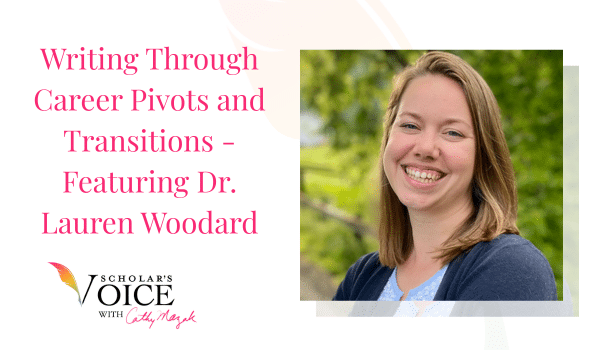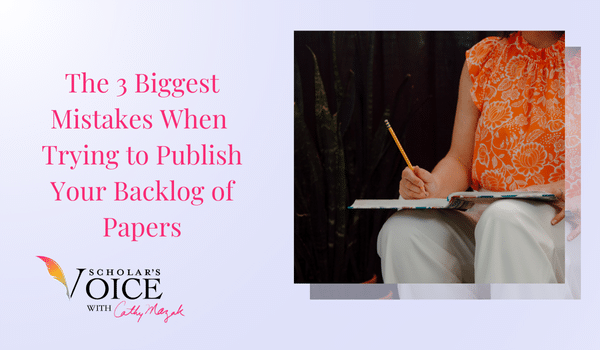You Can’t Write When You’re Mad

Today’s topic—You Can’t Write When You’re Mad—came to me after a conversation with my friend. We have all experienced how emotions, especially anger, can seriously impact our writing ability. Whether it’s dealing with unfair treatment at work, frustrating feedback from reviewers, or just the general stress of academic life, these emotional hurdles can stall our writing.
MORE DETAILS
Writing is not just about meeting due dates or reporting facts. It’s a creative process that requires the right mindset. Acknowledging and working through our emotions can make us more productive in the long run.
So, tune in for a discussion about how anger impacts writing. From examples of anger in academia to practical, actionable tips to navigate emotions in your writing practice, I explore the correlation between academic writing and emotional well-being.
Writing is Emotional
Writing, a creative act, is deeply intertwined with our emotions. It’s crucial to acknowledge that our current emotional state inevitably seeps into our writing. This is why I don’t advocate for a rigid daily writing routine, as it can burden us emotionally. Conversely, writing retreats can be beneficial, allowing us to detach from our daily lives and the associated emotions, thereby facilitating a more open and productive writing process.
How Anger Shows Up in Academic Writing
Injustice – Whether it is a colleague mistreating you for no reason or unjust policies at your institution, dealing with unfair treatment is all-consuming.
Reviewer Feedback – Receiving non-constructive feedback can trigger anger, which, if left unaddressed, can hinder your writing progress. The mere thought of dealing with such feedback can escalate this emotion, leading to avoidance. It’s crucial to recognize this cycle and find effective ways to break it.
Unhelpful/Late Co-Author – An unequal partnership will make you feel resentful because the co-author is holding you/your research back.
What To Do When You Feel So Angry You Can’t Write
Anger, being a powerful emotion, can be difficult to navigate. When you find yourself overwhelmed with anger, to the point where it hampers your writing, here’s a step-by-step guide to help you regain control.
- Get specific about what you are angry about.
- Allow yourself to feel the anger and confront it.
- Decide how to proceed: stay in the anger vs. moving on from it. Treat yourself with compassion and take the time you need.
“Writing is emotional. Sometimes we see it as clinical or we might think of writing as a report – just facts that you are reporting. But that is not what writing is at all. Writing is expression. Even if you are expressing science or something that seems rather clinical, the act of expressis is connected to our emotions. As humans, if we are not in a good emotional space it is difficult to write.”
“Treat yourself with a lot of compassion for your feelings and for being a human experiencing stuff. I think what is worse than anger is the mental castigation that you are doing to yourself about the anger.”
We’ve opened the waitlist for our next cohort of Navigate: Your Writing Roadmap®. Check out the program details and get on the waitlist here.
CONTINUE THE CONVERSATION:
- Our 12-week Navigate: Your Writing Roadmap® program helps tenure-track womxn and nonbinary professors to publish their backlog of papers so that their voice can have the impact they know is possible. Get on the waitlist here!
- Cathy’s book, Making Time to Write: How to Resist the Patriarchy and Take Control of Your Academic Career Through Writing is available in print! Learn how to build your career around your writing practice while shattering the myths of writing every day, accountability, and motivation, doing mindset work that’s going to reshape your writing, and changing academic culture one womxn and nonbinary professor at a time. Get your print copy today or order it for a friend here!
- Want to train with us for free on your campus? Now you can when you recommend our Scholar’s Voice™ Faculty Retreats to a decision-maker on your campus! Download the brochure with the retreat curriculum and both in-person and online retreat options here.
- If you would like to hear more from Cathy for free, please subscribe to the weekly newsletter, In the Pipeline, at scholarsvoice.org. It’s a newsletter that she personally writes that goes out once a week with writing and publication tips, strategies, inspiration, book reviews and more.
FOLLOW US ON SOCIAL:
RELATED PODCASTS
Stay current in Academic Publishing
Subscribe to our newsletter:
In the Pipeline
writing tips, publishing trends, reading recomendations, free workshops





